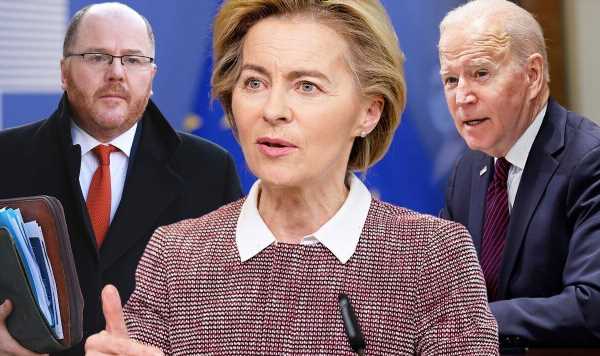Lord Frost gives update on UK’s participation in Horizon Europe
We use your sign-up to provide content in ways you’ve consented to and to improve our understanding of you. This may include adverts from us and 3rd parties based on our understanding. You can unsubscribe at any time. More info
The UK is gearing up to strike a frenzy of post-Brexit science deals – and the US is next – after it was excluded from the EU’s £80billion flagship innovation programme, Science Minister George Freeman revealed in an exclusive interview with Express.co.uk. Britain negotiated to take part in Horizon Europe, a major project which allows UK researchers the chance to access prestigious EU grants and facilitates scientific cooperation with European partners, as part of the 2020 post-Brexit Trade and Cooperation Agreement.
The Science Minister is now seriously assessing a “Plan B”, after the EU banned the UK from taking part in the program two years ago, telling Britons they cannot rejoin until the Northern Ireland Protocol dispute is resolved. Association to the programme, in which the UK was supposed to hand the EU £15billion to take part in, is still the number one objective of the Government, the minister explained.
But the Financial Times reported this week that Prime Minister Rishi Sunak asked Mr Freeman to accelerate work on a proper blueprint for the minister’s “Global Plan B”, which he said will partially involve striking deals with other science powerhouses.
And he already appears to be making ground. Last week, he visited Tokyo and announced the International Science Partnerships Fund, handing an initial £119million boost to UK researchers collaborating with scientists in Japan and around the world.
However, the minister is not stopping here, and has exclusively revealed to Express.co.uk that the US is the next country on the agenda that he is expecting to strike a deal with as he starts to lay the groundwork for his alternative to Horizon Europe.


Mr Freeman said: “There are countries all around the world that are very keen to collaborate with us. There are two bits of international collaboration that we are looking to do. Bilateral collaborations are about deepening our R +D (research and development) partnerships with powerhouse R + D economies.
“Next on that list is the US, which I will be visiting. There are almost countries within countries in the states. There’s the Boston area, life sciences, tech, space – there are some really exciting things we can do there.”
After the US, Mr Freeman said that Canada would be next. He told Express.co.uk: “There are lots of interesting things we can do there. We share an interest in polar research, arctic research and particularly in agritech and in space.”
Other countries the minister is eager to strike partnerships included South Korea, Singapore, Australia, New Zealand and Chile to name a few. But these bilateral partnerships are just one element of the global plan.

Mr Freeman explained: “As well as the individual bilateral partnerships, I am developing multilateral projects internationally, and this is very important for two reasons. The academic community will often point out that bilateral partnerships are fine as far as they go, but it is the ease of international collaboration that Horizon provides which is very valuable.”
And this is a point of view Express.co.uk has heard before. James Wilsdon, a Professor of Research Policy at the University of Sheffield, previously told Express.co.uk: “You can’t really have a Plan B for recreating big collaborative network projects. It is certainly a significant setback to the UK’s ambition to remain at the forefront of global science.
“We know, and there is ample evidence, that collaborative research is in general higher quality in terms of the influence it has. And in a lot of areas, you can’t really tackle key problems without collaborations with key groups.
“Even in a post-Brexit context there’s plenty of countries outside of the EU who are members of Horizon, and the Government always said we would stay in the framework programmes even if we did Brexit. So in a sense, to not be in them is an unnecessary act of self-harm to British science.”
DON’T MISS
China’s Covid situation has World Health Organization ‘very concerned’ [REVEAL]
EU ‘funding repressive regimes’ and how it could backfire on bloc [INSIGHT]
Octopus Energy to acquire Bulb’s 1.5million customers in huge lifeline [REPORT]

But by forming multilateral partnerships, or in other words, forming a collaborative group with multiple countries, Mr Freeman is hoping that the UK research community will be convinced by his plan.
He said: “You could have three, four or five countries in each of these programmes. We can target some specific areas around the world where we have got real science and technology expertise and convening power, like in polar research for example.”
While Mr Freeman may be gearing up to roll out the alternative plan, leading academics have repeatedly urged the EU to let Britain back into Horizon Europe. The Stick to Science campaign, for instance, has collected over 5,500 signatures from 76+ countries, with signatories from research funders and academies, to university alliances and international research centres.
A spokesperson for Universities UK International said: “If not associated to EU programmes, the UK and Switzerland (also blocked) will have to redirect their international collaborations with other parts of the world.”
The Government has also constantly urged the EU to reconsider, arguing that the bloc has “weaponised” science by dragging researchers needlessly into a Brexit feud with which they have nothing to do with. The EU is still withholding the fund promised to the UK’s top brains, even telling some that they can only keep their grants if they move to the EU or a Horizon-associated country.
Source: Read Full Article
